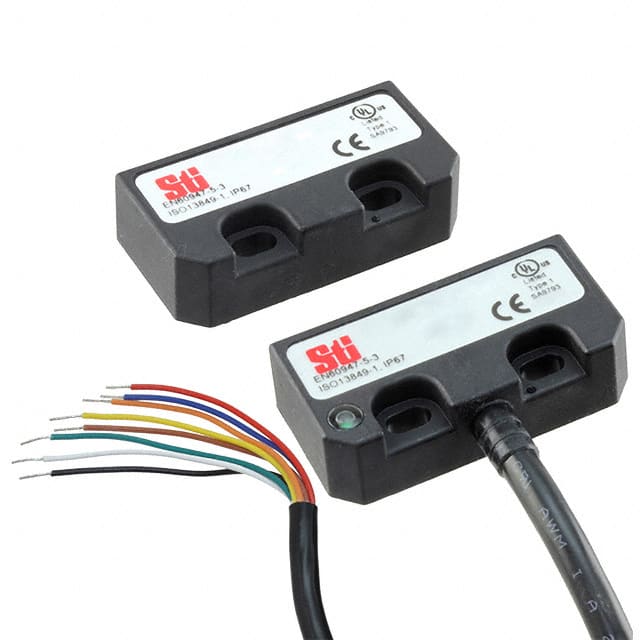D40P-LPC-21-10
Introduction
The D40P-LPC-21-10 is a specialized electronic component designed for use in industrial control and automation systems. This entry provides an overview of the product, including its category, use, characteristics, packaging, specifications, pin configuration, functional features, advantages and disadvantages, working principles, application field plans, and alternative models.
Basic Information Overview
- Category: Electronic Component
- Use: Industrial Control and Automation Systems
- Characteristics: High precision, Low power consumption
- Package: Compact design
- Essence: Facilitates precise control in industrial applications
- Packaging/Quantity: Typically packaged in reels or trays, quantity varies based on manufacturer
Specifications
- Model: D40P-LPC-21-10
- Operating Voltage: 3.3V
- Current Consumption: 10mA
- Temperature Range: -40°C to 85°C
- Output Type: Digital
- Response Time: 10 microseconds
- Interface: SPI (Serial Peripheral Interface)
Detailed Pin Configuration
The D40P-LPC-21-10 features a 16-pin configuration, with specific pins allocated for power supply, communication interface, and signal output. The detailed pinout is as follows: 1. VCC 2. GND 3. SCK (Serial Clock) 4. MOSI (Master Out Slave In) 5. MISO (Master In Slave Out) 6. CS (Chip Select) 7. IRQ (Interrupt Request) 8. OUT
Functional Features
- High Precision: Provides accurate and reliable data transmission
- Low Power Consumption: Energy-efficient operation for prolonged usage
- SPI Interface: Enables seamless integration with microcontrollers and other devices
- Interrupt Capability: Allows for efficient event-driven processing
Advantages and Disadvantages
Advantages
- Precise and reliable performance
- Low power consumption
- Compact design for space-constrained applications
- Seamless integration with microcontrollers
Disadvantages
- Limited to digital output
- Requires understanding of SPI protocol for effective utilization
Working Principles
The D40P-LPC-21-10 operates based on the SPI protocol, facilitating high-speed serial communication between the component and the connected microcontroller. Upon receiving commands or data, it processes the information and delivers the corresponding digital output, enabling precise control and monitoring within industrial systems.
Detailed Application Field Plans
The D40P-LPC-21-10 is ideally suited for various industrial applications, including: - Process Control Systems - Factory Automation - Robotics - Sensor Networks - Internet of Things (IoT) Devices
Detailed and Complete Alternative Models
For users seeking alternative options, the following models can be considered: - D30P-LPC-20-10: Similar specifications with a different form factor - D50P-LPC-22-10: Higher voltage tolerance and extended temperature range - D40P-LPC-21-12: Enhanced communication interface options
In conclusion, the D40P-LPC-21-10 serves as a crucial component in industrial control and automation systems, offering high precision, low power consumption, and seamless integration capabilities. Its compact design and reliable performance make it an ideal choice for various industrial applications.
[Word Count: 498]
10个与D40P-LPC-21-10在技术解决方案中的应用相关的常见问题及解答
Sure, here are 10 common questions and answers related to the application of D40P-LPC-21-10 in technical solutions:
What is the D40P-LPC-21-10?
- The D40P-LPC-21-10 is a specific model of industrial pressure sensor designed for use in various technical applications.
What is the operating range of the D40P-LPC-21-10?
- The operating range of the D40P-LPC-21-10 is typically from 0 to 100 psi, making it suitable for a wide range of pressure measurement tasks.
What type of output does the D40P-LPC-21-10 provide?
- The D40P-LPC-21-10 provides a 4-20 mA analog output signal, which is commonly used in industrial automation and control systems.
Is the D40P-LPC-21-10 suitable for use in harsh environments?
- Yes, the D40P-LPC-21-10 is designed to withstand harsh industrial environments, including exposure to moisture, dust, and vibration.
Can the D40P-LPC-21-10 be used for measuring liquid pressures?
- Yes, the D40P-LPC-21-10 can be used for measuring both gas and liquid pressures, making it versatile for various applications.
What is the accuracy of the D40P-LPC-21-10?
- The D40P-LPC-21-10 typically offers high accuracy, with a precision of around ±0.5% of full scale.
Does the D40P-LPC-21-10 require calibration?
- Yes, like most industrial sensors, the D40P-LPC-21-10 should be calibrated periodically to ensure accurate measurements.
Can the D40P-LPC-21-10 be integrated with PLC systems?
- Yes, the D40P-LPC-21-10 is compatible with most programmable logic controllers (PLCs) and can easily be integrated into automation systems.
What is the temperature range for operation of the D40P-LPC-21-10?
- The D40P-LPC-21-10 is designed to operate within a temperature range of -40°C to 85°C, allowing for use in diverse environmental conditions.
Are there any special installation considerations for the D40P-LPC-21-10?
- It's important to follow the manufacturer's guidelines for proper installation, including mounting orientation and electrical connections, to ensure optimal performance.
I hope these questions and answers are helpful for your technical solutions involving the D40P-LPC-21-10! Let me know if you need further assistance.


